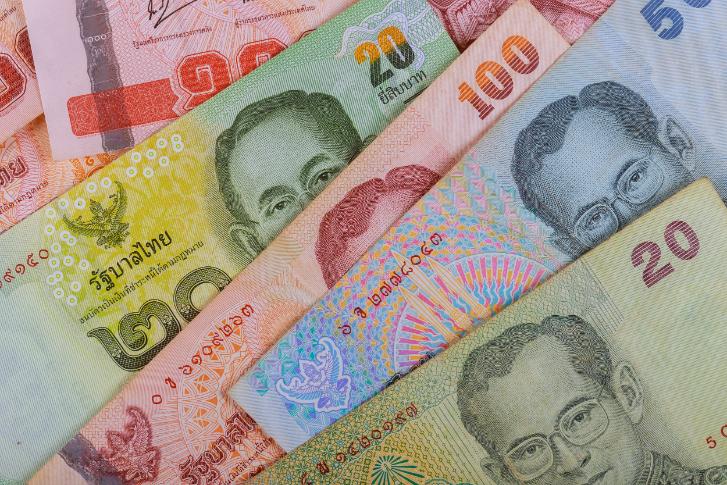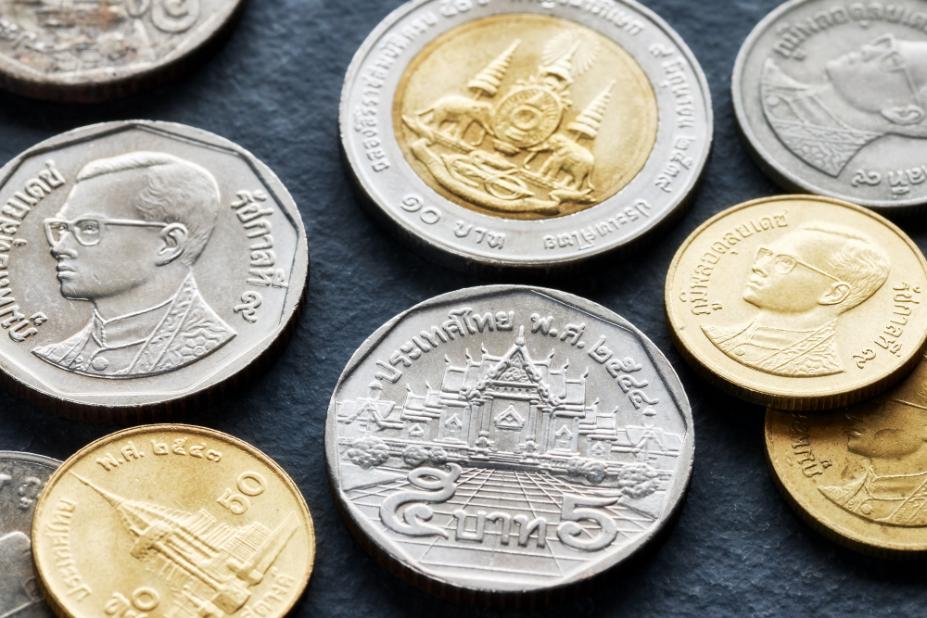The Ultimate Guide to Thailand's Currency: The Thai Baht
Thailand is an amazing country to visit, and it’s becoming increasingly popular with travelers who want to experience a new and exciting culture. For people who are planning to visit Thailand, understanding the local currency – the Thai Baht – is essential. The Thai Baht is the official currency of Thailand and is widely accepted throughout the country.
In this blog post, we'll be sharing everything that you need to know about Thailand's currency – the Thai Baht, including its history, denominations, exchange rates, and tips on managing your money in Thailand.
A Short Recap of Thailand's Currency
The Thai Baht (THB) has a long and fascinating history. It was first introduced in the 19th century as a unit of currency for the country, replacing the pot duang – a baked clay coin that had been used for centuries. Over the years, the Thai Baht has gone through several changes, including its design and denominations.
Today, the Bank of Thailand is responsible for issuing the Baht note, and it is widely recognized as one of the most stable currencies in Southeast Asia.
The Thai Baht History & Evolution
Journeying back to ancient Siam, barter, and trade were the coins of the realm. But as time whispered its secrets, metallic treasures emerged – cowrie shells, beads, and even agricultural produce – forming the early currency roots. Fast forward through the sands of time, and silver coins known as "Bullet" or "Bullet Money" made their glittering entrance, symbolizing the kingdom's growing economic prowess.
Then came the era of baht. Legend whispers that the word "baht" itself might have originated from the Sanskrit word "bharta," meaning "to bear" or "to carry," symbolizing the responsibility of wealth. The baht journeyed through dynasties and changes, emerging officially in 1857, engraved with the reign of King Mongkut, Rama IV.
It originated from a traditional unit of mass, and its value was originally expressed as that of silver of corresponding weight (15 grams). The baht was decimalized in the late 18th century by King Rama I, and became equivalent to 100 satang.
Banknote Denominations
One of the first things you’ll notice about the Thai Baht is the variety of banknote denominations. The Baht currency note comes in denominations of 20, 50, 100, 500, and 1,000, making it quite easy to carry and manage your cash while traveling. The notes feature images of Thai monarchs and other significant figures in Thailand's history, as well as famous landmarks such as the Temple of the Emerald Buddha and the Golden Palace.
Baht Coins
In addition to the banknotes, the official currency of Thailand, the Thai Baht, also has coins. Baht coins come in denominations of 1, 2, 5, and 10. The Baht coins are made of different materials, with the 1 Baht coin being made of bronze, the 2 Baht coin being made of nickel, the 5 Baht coin being made of copper, and the 10 Baht coin being made of a copper-nickel mixture. The coins also feature images of important Thai symbols, such as the king and the national emblem.
Is Thai Currency Strong? Thailand Currency Exchange Rates

The convergence of a strengthened dollar, a sluggish Chinese economy, and soaring oil prices has brewed a concerning blend impacting numerous ASEAN economies and Asian currencies, with Thailand's currency being notably affected. The Thai Baht has not just weakened but exhibited fluctuations, triggering apprehensions among exporters who might find it challenging to leverage this depreciation to their advantage.
As of the latest update, the current rate of exchange stands at 1.00 US Dollar = 34.583972 Thai Baht, while 1 Thai Baht equals 0.0289151 USD. However, as currency values are subject to constant fluctuations influenced by various economic factors, it's important to keep an eye on these changes.
To ensure you stay updated on the most recent shifts in the Thai Baht exchange rate, consider signing up for our exchange rate alerts. This service will provide you with timely notifications, enabling you to track fluctuations and make informed decisions regarding currency exchanges or financial transactions involving the US Dollar and the Thai Baht.
Ready to buy?
Are you ready to buy your currency? Stop waiting and request a Shipping Kit. We will provide everything you need to ship and receive funds for currencies you own.
The baht has experienced significant fluctuations throughout its history, especially in the last 50 years. Some of the major events that affected the baht’s exchange rate are:
- The Bretton Woods system (mid-1950s-1997): The baht was initially pegged to the US dollar at a rate of 20 baht per dollar and then adjusted to 25 baht per dollar during the Reagan presidency.
- The Asian financial crisis (1997-1998): The baht was floated in July 1997, triggering a massive currency crisis that spread across Asia. The baht plunged to a record low of 56.50 baht per dollar in January 1998 before recovering to around 40 baht per dollar by the end of the year.
- The global financial crisis (2008-2009): The baht was relatively stable during the global financial crisis, as Thailand had strong macroeconomic fundamentals and foreign reserves. The baht appreciated from 34 baht per dollar in January 2008 to 28 baht per dollar in July 2008 before depreciating to 35 baht per dollar in March 2009.
- The political turmoil (2010-2014): The baht was affected by the political instability and social unrest that plagued Thailand from 2010 to 2014. The baht fluctuated between 29 and 33 baht per dollar during this period, reflecting the uncertainty and risk aversion of investors.
- The military coup (2014-present): The baht was initially stable after the military coup in May 2014, as the political situation stabilized and the economy recovered. However, it started to weaken in 2015 due to the slowdown of the Chinese economy, the US interest rate hike, and the decline of tourism and exports. It reached a low of 37.25 baht per dollar in October 2015 before appreciating to around 32 baht per dollar in 2017. The baht continued to strengthen in 2018 and 2019, reaching a high of 29.60 baht per dollar in October 2019, as Thailand had a large current account surplus and foreign reserves. It then depreciated again in 2020 and 2021 due to the impact of the COVID-19 pandemic on the Thai economy, especially the tourism sector, trading at around 35 baht per dollar as of December 2021.
You can always use our currency converter to check the current rates for the Thailand currency, as well as any other currency you're interested in.
Managing Your Money in Thailand

While Thailand is a predominantly cash-based society, it is also possible to make credit card payments in many locations. However, it's important to note that using your foreign card in Thailand can come with poor rates and high transaction fees. Cash is still king in many areas, so it's always advisable to carry some cash with you.
You can withdraw money from ATMs with your foreign ATM or debit card or use a prepaid card. It's essential to shop around for the best rates, and if you can, avoid exchanging money at the airport, as the rates may not always be competitive.
Consider Prepaid Travel Cards
Prepaid travel cards can be a great option for travelers in Thailand. These cards can be loaded with Thai currency before you go, allowing you to avoid paying foreign transaction fees and withdraw cash at a better exchange rate from ATMs while in Thailand. Prepaid travel money cards are becoming more readily available, and it's worth considering one if you're planning to travel around Thailand for an extended period.
Smart Moves: Avoiding High Currency Exchange Fees
When navigating Thailand to steer clear of hefty fees, it's crucial to avoid certain common pitfalls. Firstly, be wary of utilizing hotel exchange desks, which often offer poor rates. These might seem convenient, but they frequently provide less favorable exchange rates compared to other options. Similarly, while banks are a trusted entity for currency exchanges, they often impose substantial fees and offer subpar rates, denting the value of your exchange.
Instead, opt for reputable currency exchange offices or specialized kiosks, where you can often find more competitive rates and lower fees. Additionally, consider using ATMs aligned with major banks to withdraw local currency, but be mindful of potential withdrawal fees imposed by both the ATM provider and your home bank. Of course, you can always buy Thailand currency in advance at great rates at US First Exchange.
These strategies can help you sidestep unnecessary expenses while converting your currency when in Thailand.
Trust in Authenticity: How to Safeguard Against Fake Banknotes in Thailand
There have been some reports of counterfeit 1,000-baht banknotes circulating in northeastern Thailand, especially in Udon Thani province. The police have warned the public to look for the golden security strip embedded in all 1,000-baht notes to ensure their legitimacy. The security strip should show the words ‘1,000 BAHT’ when held up to the light and change color to green when rotated.
If you encounter a fake banknote, you should report it to the authorities immediately, as using counterfeit money can result in fines and imprisonment under Thai law. You can also check the Bank of Thailand website for more information on how to identify genuine banknotes.
Fun Facts About Thai Baht
Here are five intriguing facts about the Thailand currency:
- Royal Portraits: The Thai Baht coins and banknotes often feature the images of Thailand's beloved royalty, such as King Rama IX, who appeared on coins during his reign. These portrayals showcase the deep respect and admiration for the monarchy within Thai culture.
- Lucky Number Five: The Thai Baht coins have numerical values that correspond to royal significance. For instance, the 5-baht coin features King Rama IX's image, honoring his reign, while the 10-baht coin celebrates his 60th anniversary on the throne.
- Good Luck Talisman: The 2-baht coin is considered a lucky charm by some Thai people due to its auspicious number. The number 2 symbolizes harmony and balance, making it a favored talisman for good fortune.
- Colorful Baht Banknotes: Thai banknotes don vibrant hues and intricate designs. For instance, the 20-baht note displays green hues and portrays King Rama VII, while the 100-baht note features blue tones and the image of King Rama IX.
- Numerical Superstitions: Certain denominations of baht are considered luckier than others due to their numerical significance in Thai culture. For instance, numbers like 9 and 8 are considered particularly auspicious, believed to bring wealth and prosperity. This cultural belief influences preferences in choosing specific denominations for various occasions and transactions.
Thailand Currency: Embracing Heritage, Securing Transactions
Understanding Thailand currency can be challenging, but with this guide, you should now have a better understanding of the Thai Baht, its history, denominations, and exchange rates. While cash is still king in Thailand, it's possible to make card payments in many areas, but it's critical to look for the best rates. Need some Thai Baht for your upcoming journey? Have some leftover Thailand currency from your trip?
US First Exchange is committed to offering swift and secure currency exchanges at incredibly competitive rates. Our simplified process bypasses the inconvenience of airport and bank kiosks, ensuring cost-efficiency that benefits you directly. With our secure online platform, you can conveniently buy and sell currencies backed by insured shipping options for a seamless and reliable exchange experience.
Ready to sell?
Are you ready to sell your currency? Stop waiting and request a Shipping Kit. We will provide everything you need to ship and receive funds for currencies you own.


